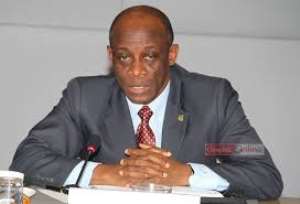
A South African economist has challenged that recently released economic growth forecast by the Breton Woods institutions, both World Bank (WB) and the International Monetary Fund (IMF).
Rand Merchant Bank’s Africa Macro Strategist for Global Markets, Madam Celeste Faauconnier has warned that, Ghana may not attain the projected four (4) percent growth rate.
Madam Faauconnier disclosed this to journalists at the Business Breakfast and Economic forum held in Accra by First National Bank Ghana, a subsidiary of FirstRand Bank Limited of South Africa.
According to her, the country may increase its expenditure this year due to the general elections.
Apparently, contrary to her assertion, the Breton Woods institution, both World Bank and the International Monetary Fund (IMF) have in their latest forecast projected a growth which likely to be more than the projected 4% growth projected by Ghana government for this year.
The IMF has projected that the Ghanaian economy will outperform the sub-Saharan Africa growth this year.
It forecasts that the economy will grow by 4.5 per cent for this year, while growth in sub-Saharan Africa is expected to remain weak this year at three per cent.
The Economic Counsellor and Director of the Research Department of the IMF, Mr Maurice Obstfeld, at a news conference in Washington DC, to launch the World Economic Outlook, said ‘the growth will be ahead of most of its peers in sub-saharan Africa.’
Subsequently, the World Bank in its recently released Africa’s Pulse report for 2016 projected a moderate growth for Ghana, citing increased investor confidence, oil production from new oilfields and solution to the country’s energy crisis.
Also, President John Mahama has expressed optimism in the economy, stating that the growth rate will inch up to about 5 percent by the end of the year and increase marginally to about 6 percent in 2017.
But, Madam Faauconnier explained that commodity prices may not go up, and with inflation still high, Ghana may not see the 4% percent growth.
“The problem is when you are in a situation where you have to cut your budget that is when your growth gets affected.
“The government had been adhering to cutting the budget and they have to otherwise sentiments will drop and the currency will blow out again”, she said.
She urged the government to strongly adhere to the directives of the IMF to avert an increase in inflation.
Moreover, according to the World Bank latest Africa’s Pulse report released last week, “the 2016 growth forecast, for the region, remains subdued at 3.3 percent, way below the robust 6.8 percent growth in GDP that the region sustained in the 2003-2008 period. However, growth is expected to pick up in 2017-2018 to 4.5 percent.
The World Bank reported that, economic activity in the Sub-Saharan Africa slowed in 2015, with GDP growth averaging 3.0 percent, down from 4.5 percent in 2014.
This means that the pace of expansion decelerated to the lows last seen in 2009.
The Report clarified that, “The plunge in commodity prices – particularly oil, which fell 67 percent from June 2014 to December 2015 – and weak global growth, especially in emerging market economies, are behind the region’s lackluster performance. In several instances, the adverse impact of lower commodity prices was compounded by domestic conditions such as electricity shortages, policy uncertainty, drought, and security threats, which stymied growth.”
The World Bank Vice President for Africa, Makhtar Diop advised that “As countries adjust to a more challenging global environment, stronger efforts to increase domestic resource mobilization will be needed. With the trend of falling commodity prices, particularly oil and gas, it is time to accelerate all reforms that will unleash the growth potential of Africa and provide affordable electricity for the African people,”




 Saglemi Housing Project will not be left to rot – Kojo Oppong Nkrumah
Saglemi Housing Project will not be left to rot – Kojo Oppong Nkrumah
 Transport fares hike: GPRTU issue two-day ultimatum
Transport fares hike: GPRTU issue two-day ultimatum
 ARC endorses Alan as presidential candidate – Buaben Asamoa
ARC endorses Alan as presidential candidate – Buaben Asamoa
 Akufo-Addo appoints Kwasi Agyei as new Controller and Accountant-General
Akufo-Addo appoints Kwasi Agyei as new Controller and Accountant-General
 PNC dismiss reports of mass resignations
PNC dismiss reports of mass resignations
 PAC advocates for revenue collectors to be engaged on commission basis, not full...
PAC advocates for revenue collectors to be engaged on commission basis, not full...
 Genser Energy commissions 110km of natural gas pipeline at Anwomaso
Genser Energy commissions 110km of natural gas pipeline at Anwomaso
 Naa Torshie calls for tolerance, peace ahead of 2024 election
Naa Torshie calls for tolerance, peace ahead of 2024 election
 Asantehene commends Matthew Opoku Prempeh for conceiving GENSER Kumasi Pipeline ...
Asantehene commends Matthew Opoku Prempeh for conceiving GENSER Kumasi Pipeline ...
 Let’s do away with ‘slash and burn politics’ in Ghana — Dr Adutwum
Let’s do away with ‘slash and burn politics’ in Ghana — Dr Adutwum
